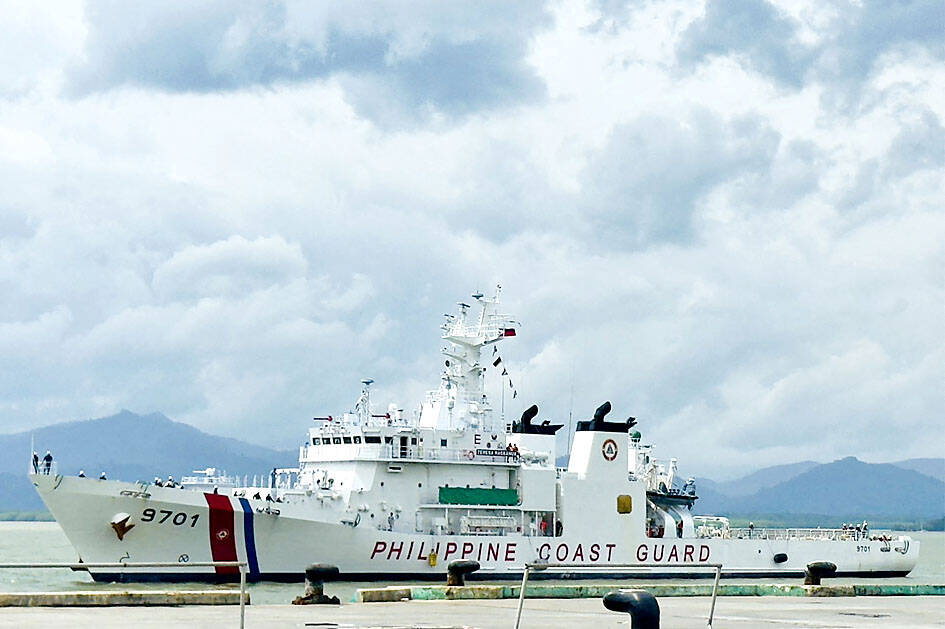The Philippines withdrew its coast guard vessel from a South China Sea shoal that has recently been at the center of tensions with Beijing.
BRP Teresa Magbanua “was compelled to return to port” from Sabina Shoal (Xianbin Shoal, 仙濱暗沙) due to bad weather, depleted supplies and the need to evacuate personnel requiring medical care, the Philippine Coast Guard (PCG) spokesman Jay Tarriela said yesterday in a post on X.
The Philippine vessel “will be in tiptop shape to resume her mission” after it has been resupplied and repaired, Philippine Executive Secretary Lucas Bersamin, who heads the nation’s maritime council, said in a statement earlier yesterday.

Photo: the Philippine Coast Guard via AFP
The ship’s pullout could work in Beijing’s favor. China has repeatedly called for the immediate withdrawal of Philippines vessels from the disputed shoal, including during a diplomatic meeting last week.
China claims almost the entire South China Sea, a key trade route with huge energy potential.
Sabina Shoal has recently emerged as a hot spot in the maritime dispute between China and the Philippines, a key US ally. Beijing and Manila have traded accusations of intent to establish a permanent presence at the coral atoll.
China Coast Guard spokesman Liu Dejun (劉德軍) in a statement on social media said that the Chinese maritime police would continue to carry out law enforcement activities in the waters under China’s jurisdiction, in accordance with the law, and would resolutely safeguard the nation’s territorial sovereignty and maritime rights and interests.
Local media in the Philippines shared photos on social media showing PCG personnel leaving the ship on stretchers, reportedly due to dehydration after five months at sea.
In 2012, Philippine vessels pulled out from Scarborough Shoal (Huangyan Island, 黃岩島), another South China Sea flashpoint also claimed by China and Taiwan, after a standoff with China. Beijing has since exercised effective control of the chain of reefs and rocks, with its ships guarding the area.

Conflict with Taiwan could leave China with “massive economic disruption, catastrophic military losses, significant social unrest, and devastating sanctions,” a US think tank said in a report released on Monday. The German Marshall Fund released a report titled If China Attacks Taiwan: The Consequences for China of “Minor Conflict” and “Major War” Scenarios. The report details the “massive” economic, military, social and international costs to China in the event of a minor conflict or major war with Taiwan, estimating that the Chinese People’s Liberation Army (PLA) could sustain losses of more than half of its active-duty ground forces, including 100,000 troops. Understanding Chinese

The Ministry of Foreign Affairs (MOFA) yesterday said it is closely monitoring developments in Venezuela, and would continue to cooperate with democratic allies and work together for regional and global security, stability, and prosperity. The remarks came after the US on Saturday launched a series of airstrikes in Venezuela and kidnapped Venezuelan President Nicolas Maduro, who was later flown to New York along with his wife. The pair face US charges related to drug trafficking and alleged cooperation with gangs designated as terrorist organizations. Maduro has denied the allegations. The ministry said that it is closely monitoring the political and economic situation

‘SLICING METHOD’: In the event of a blockade, the China Coast Guard would intercept Taiwanese ships while its navy would seek to deter foreign intervention China’s military drills around Taiwan this week signaled potential strategies to cut the nation off from energy supplies and foreign military assistance, a US think tank report said. The Chinese People’s Liberation Army (PLA) conducted what it called “Justice Mission 2025” exercises from Monday to Tuesday in five maritime zones and airspace around Taiwan, calling them a warning to “Taiwanese independence” forces. In a report released on Wednesday, the Institute for the Study of War said the exercises effectively simulated blocking shipping routes to major port cities, including Kaohsiung, Keelung and Hualien. Taiwan would be highly vulnerable under such a blockade, because it

UNRELENTING: China attempted cyberattacks on Taiwan’s critical infrastructure 2.63 million times per day last year, up from 1.23 million in 2023, the NSB said China’s cyberarmy has long engaged in cyberattacks against Taiwan’s critical infrastructure, employing diverse and evolving tactics, the National Security Bureau (NSB) said yesterday, adding that cyberattacks on critical energy infrastructure last year increased 10-fold compared with the previous year. The NSB yesterday released a report titled Analysis on China’s Cyber Threats to Taiwan’s Critical Infrastructure in 2025, outlining the number of cyberattacks, major tactics and hacker groups. Taiwan’s national intelligence community identified a large number of cybersecurity incidents last year, the bureau said in a statement. China’s cyberarmy last year launched an average of 2.63 million intrusion attempts per day targeting Taiwan’s critical